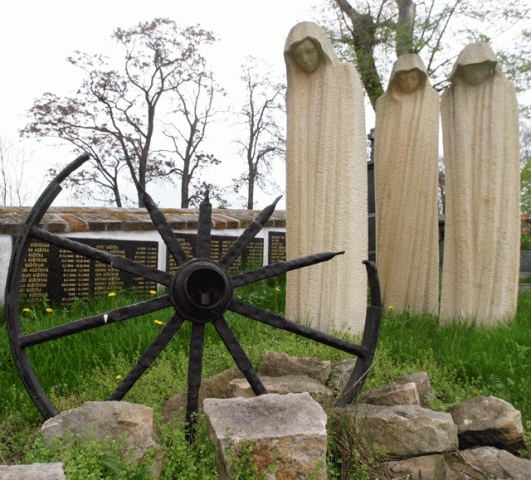EU under fire over Czech pig farm on Roma Holocaust site
"It was up to EU member states to decide where subsidies were paid," says activist

This file photo taken on May 04, 2005 shows a memorial to the Romany Holocaust victims which was unveiled in 2000 at the Mirovice cemetery next to a huge industrial pig farm situated at the site of former concentration camp in Lety, south Bohemia. PHOTO: AFP
"The fact that European taxpayers' money is heading to (the farm) runs counter to the values on which the EU was built," said activist Miroslav Broz, a coordinator at the Konexe anti-racism association.
"When you arrive at the pig farm, you can see EU logos and flags and inscriptions saying the EU is subsidising the operation and upgrades of this farm," he told AFP a day after May 16, which is the international Roma Resistance Day.
Honoring Holocaust heroes, Obama warns against rise of intolerance
Jan Michal, head of the European Commission's representation in Prague, said it was up to EU member states to decide where subsidies were paid.
"The European Commission manages the common agricultural policy but it is up to the individual member states to name the recipients of the support," he said.
Broz said Konexe had already complained to the EU over the pig farm in 2014.
"We hope that Brussels will adjust this system of financing so that this building on a genocide site cannot receive subsidies," said Broz.
Built in the 1970s in the southwestern village of Lety by the communist Czechoslovak regime, the pig farm has reaped criticism at home and abroad ever since the regime was toppled in 1989, four years before Czechoslovakia split into two states.
Netanyahu Holocaust comment not backed by scholarly evidence: US
Between 1940 and 1943, Nazi Germany and its Czech collaborators imprisoned close to 1,300 Czech Roma at the camp.
Alongside European Jews, the continent's smaller Roma minority was also a target of Nazi genocide during World War II.
Some 327 Roma, including 241 children, died at the camp staffed by an ethnic Czech commander and guards, while more than 500 were sent to Nazi Germany's infamous Auschwitz-Birkenau death camp in occupied southern Poland.
Israeli Holocaust survivor could be world's oldest man: Guinness
Of the 9,500 Czech Roma registered before World War II, fewer than 600 returned home after the Holocaust.
The Czech Republic, an EU country of 10.5 million, has a Roma community estimated to number between 250,000 and 300,000.
Of the roughly one million Roma who lived in Europe prior to WWII, historians believe the Nazis exterminated over half.



















COMMENTS
Comments are moderated and generally will be posted if they are on-topic and not abusive.
For more information, please see our Comments FAQ